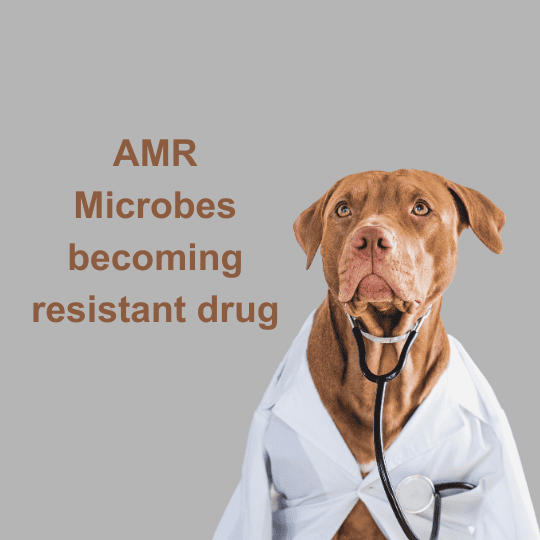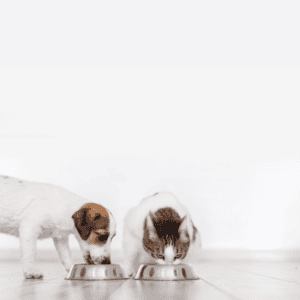Problem of microbes becoming resistant to drugs (AMR) is a serious warning of superbugs.
The problem of microbes becoming resistant to drugs has become a serious worldwide issue in recent years, impacting the health of both animals and humans.
Japan Animal Hospital (JAH), a committed animal hospital in Cambodia, works hard to protect the health of our cherished animal companions and support the global fight against AMR.
What are antimicrobials?
Antimicrobials is the name of the group of medicines used to treat infectious diseases caused by microbes such as bacteria, fungi, viruses, and protozoan parasites. You are probably already familiar with the class of antimicrobial medications known as antibiotics.
Antibiotics
I can help you with paraphrasing your sentence. Here is one possible way to restate your sentence using different words:
Penicillin is one of the most famous antibiotics. Antibiotics are usually used to fight bacterial infections. But they are ineffective against viruses. Moreover, using antibiotics when you have a viral infection can be dangerous as it can cause the bacteria that normally live in our bodies to change.
Antibiotics in animal health
The problem of overusing and misusing antibiotics in animals has been going on for years, especially the regular use of antibiotics in farm animals. This has resulted in the emergence of resistant bacteria. Many of them can spread from animals to humans and vice versa, leading to zoonotic diseases (diseases that affect both animals and humans).
Superbugs
Antibiotics and other antimicrobial agents are vital for treating bacterial infections in animals in veterinary medicine. However, the overuse and misuse of antibiotics and the adaptability of some bacteria have resulted in the emergence of what are known as “superbugs”. Superbugs are bacteria that have become resistant to drugs that are meant to destroy them. As a result, infections that were once easy to cure can become deadly, causing prolonged sickness, higher healthcare expenses, and even death.
Some examples of superbugs are:
Escherichia coli: Bacteria that is commonly present in the small and large intestines of humans, domestic animals, and wild animals. It can cause food-related diseases and make urinary infections hard to treat, especially in women.
Salmonella: Often found in the intestinal tract of many animals. It can cause food-related diseases, severe intestinal infections, and blood poisoning that are frequently fatal.
Staphylococcus aureus: Usually found in the skin of mammals. Can cause fatal infections and blood poisoning in patients with weak immune systems, such as children, the elderly, or sick people in hospitals.
Mycobacterium tuberculosis: Bacteria that is commonly found in the respiratory tract of many animals and causes the tuberculosis disease, where antibiotic treatment is required for more than 6 months or even for a lifetime with little hope of recovery.
What are the implications of this for our region?
Current situation of AMR
The current scenario in human and animal health shows that some infections are becoming untreatable, and routine surgeries, both in humans and animals, could become life-threatening if a resistant bacteria lands on a surgery site. Currently, there is little hope that new antibiotics will be discovered soon, and only six new antibiotics have been discovered in the last decade.
In 2019, Antimicrobial Resistance caused more deaths than AIDS infections and Malaria. By 2050 AMR is projected to cause the death of up to 10 million people per year.
Additionally, the cross-border movement of animals in this region can facilitate the spread of AMR across national boundaries.
The role of Japan Animal Hospital in combating AMR
As advocates for animal health and welfare, we recognize our responsibility in addressing the AMR crisis. Here’s how our veterinary clinic is playing a crucial role:
- Promoting responsible antibiotic use: We are committed to educating pet owners about the proper use of antibiotics. This includes explaining dosage instructions, emphasizing the importance of completing the full course of treatment, and raising awareness about the dangers of using leftover antibiotics without professional consultation.
- Implementing infection prevention and control: Preventing infections from occurring in the first place is key to reducing the need for antibiotics. We prioritize hygiene and sanitation in our clinic, minimizing the risk of infections and reducing the demand for antimicrobial treatments.
- Advocating for regular check-ups: Regular veterinary check-ups enable us to detect health issues early, providing the opportunity for timely interventions that may not necessitate antibiotics. Preventive care also helps to maintain the overall health of animals, reducing the likelihood of infections.
- Exploring alternative treatments: We actively explore and recommend alternative treatments, such as probiotics, and immune-strengthening strategies, that can aid in managing infections without contributing to AMR.
What you can do to prevent AMR
You can actively participate in preventing Antimicrobial Resistance from becoming a greater threat to human and animal health by taking these actions:
- If your pet is sick, take it to a vet who will diagnose and suggest a treatment plan
- If you are instructed to give your pet antibiotics, thoroughly follow the instructions of your vet
- Never use over-the-counter antibiotics, left-over antibiotics, or human antibiotics for your pet
- Buy preferably organic and small-scale food products; they are less likely to use antibiotics as preventive medicine and as a growth promoter in their farm animals.
- Follow preventive medicine measures with you and your pet. Bring your pet to Japan Animal Hospital (JAH) for general checkups and regular vaccinations. Some bacterial diseases, like kennel cough and leptospirosis in dogs, can be easily prevented through vaccination.
Finally, keep in mind that health issues should be approached from a One Health perspective, where healthy animals, healthy people, and a healthy environment are all linked together.
Book your dog’s consultation
- Phone: 010 303 088
- Telegram: 010 303 088
- Facebook : (1) Facebook
- Email: [email protected]
- Contact us today : Contact Us | Japan Animal Hospital Today
Visit us in No.M43, Preah Trasak Paem St. (63), Phnom Penh, Cambodia




